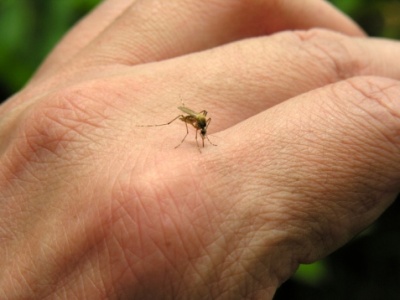Take a Bite Out of Mosquito Stings
 While mosquitoes can carry blood-borne diseases like malaria, West Nile encephalitis and dengue fever, it is the aggravating bite that gives them their notoriety.
While mosquitoes can carry blood-borne diseases like malaria, West Nile encephalitis and dengue fever, it is the aggravating bite that gives them their notoriety.
Only female mosquitoes bite. Heat, light, sweat, body odor, lactic acid and carbon dioxide attract the female mosquito to skin. She inserts the tip of her mouth into a tiny blood vessel, injects her saliva into your bloodstream and then sucks your blood.
Contact must last at least six seconds in order for a reaction to occur. Chemicals in mosquito saliva prevent blood from clotting and evoke a response that causes localized redness, swelling and itching.
A mosquito bite can cause a variety of reactions. People who have never been bitten before (primarily young children) may not react at all. Thereafter, most of us develop a tiny, itchy red bump that appears hours to days after they have been bitten and may last a few days.
However, some people have more serious reactions like blistering lesions or larger hives accompanied by fever and joint swelling. At its worst, a mosquito bite can cause anaphylaxis (an-a-fi-LAK-sis), a potentially life-threatening condition characterized by throat swelling, generalized hives, faintness or wheezing. This reaction is rarely caused by mosquitoes and is more commonly associated with other stinging insects. If you have experienced anaphylaxis, consider consulting an allergy/immunology specialist, who can help determine the cause. Carry autoinjectable epinephrine if you have been diagnosed with stinging insect anaphylaxis.
Treatment Tips
If you develop anaphylactic symptoms, seek emergency medical treatment.
If your reaction is localized, try these treatments to relieve symptoms:
• Elevate the affected area and apply ice to reduce swelling and pain.
• Apply over-the-counter lotion to the affected area.
• Clean blisters with soap and water without breaking them.
• If itching persists, try topical steroids or oral antihistamines.
• Consult a physician if the swelling progresses or the area appears infected.
Avoiding Mosquitoes
These pests may seem impossible to avoid, but there are steps you can take to reduce your chance of a mosquito bite.
Stay indoors as much as possible from dusk to dawn – peak mosquito time.
During the day, avoid standing near calm, shaded, humid areas and avoid pools of standing water. These are popular places for mosquitoes to hang out.
What you wear can attract mosquitoes. Avoid bright clothing and heavy perfumes. Wear clothing that covers most of your skin to minimize the chance for mosquitoes to bite.
Use insect repellents containing DEET. Read the label of your repellent carefully. DEET will often be listed under the active ingredients as N, N-diethyl-meta-toluamide. Products with 6 to 25% DEET should provide two to six hours of protection. Repellents can cause side effects, including eye irritation, dry skin, rash and possible allergic reaction. Before applying to your entire body, test the repellent on a small area of your skin. Use the lowest concentration that is effective for you and reapply as needed.
Find out more about stinging insect allergies.
1/10/2024